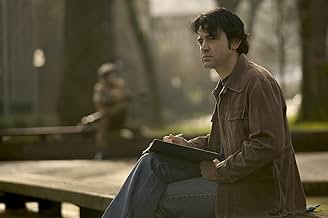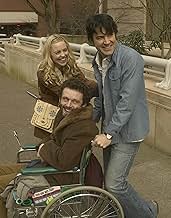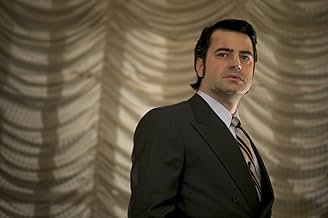IMDb RATING
7.2/10
6.1K
YOUR RATING
Richard Pimentel began his life as a fighter, and his life's work became fighting for the rights of others. After losing his hearing in Nam, he overcame his handicap and used his public spea... Read allRichard Pimentel began his life as a fighter, and his life's work became fighting for the rights of others. After losing his hearing in Nam, he overcame his handicap and used his public speaking skills to inspire injured war veterans.Richard Pimentel began his life as a fighter, and his life's work became fighting for the rights of others. After losing his hearing in Nam, he overcame his handicap and used his public speaking skills to inspire injured war veterans.
- Awards
- 1 win & 1 nomination
TyZhaun Lewis
- Aaron
- (as Lewis Tyzhaun)
Arlene Ancheta
- Chinese Woman
- (as Arlene Anchette)
- Director
- Writers
- All cast & crew
- Production, box office & more at IMDbPro
Storyline
Did you know
- TriviaMelissa George's character is introduced in the film while rollerskating at a skating rink; prior to becoming an actress, George was a national rollerskating champion in her native Australia.
- GoofsThe novel "Choke", by Chuck Palahniuk, not published until 2001, is in the bookcase next to Richard as he speaks to Art who has just proofread the manuscript of Windmills.
- SoundtracksYou're Nobody 'Til Someone Loves You
Written by James Cavanaugh, Russ Morgan, Larry Stock
Performed by Dean Martin
Featured review
Are you familiar with the character "Geordi" on Star Trek the Next Generation? He's a blind character on the Starship Enterprise, Chief Engineer. The problem? He just happens to have a visor that enables him to see perfectly, so he's basically no different from a sighted person. Just a gimmick with a goofy visor.
Similarly, in "Music Within", we get a supposedly deaf man, but after a 12-second montage of him learning to read lips, he is absolutely "normal". He understands people just fine (even when their backs are to him), and when they speak to him he looks them in the eye, not the lips (major oversight by actor Ron Livingston). And just like Geordi's visor, he has a mysterious device strapped to his telephone that makes him able to understand everything perfectly (even though we're repeatedly shown that $1000 hearing aids don't work for him).
Why am I making such a big deal of this seemingly insignificant point? Because it undermines the supposed message of the whole story: that disabled people are exceptional *in their own right*. By making the lead character a deaf person who can hear, by making Geordi a blind man who can see, Hollywood glosses over the reality of having a disability thereby reducing it to trivial.
And that's my gripe with this movie; it's has a very "ABC Afterschool Special" feel to it. The producers tackle a difficult subject but only superficially. Just enough to give us a rousing feeling of warmth.
Is that warmth, or is that just my colostomy bag springing a leak again? Sheesh.
Like several other reviewers, I give this movie a thumbs up for a great subject, but I give it a thumbs down for its clunky, superficial and slightly hypocritical presentation. The whole thing feels somewhat contrived.
The scenes showing discrimination are cartoonishly brutal, and it makes you think everyone in the 70s was a tactless creep. I was alive in the 70s, and while I fully agree that disabled people were overlooked, I never noticed the outright hatred that is portrayed in this film. And we're supposed to believe that the American Disabilities Act suddenly made people tolerant & friendly? That's a little too black&white for me to swallow.
On another note, I agree with what another reviewer said about casting Ron Livingston as Richard Pimmentel. The real Richard Pimmentel is a heavyset man. Why couldn't the producers cast someone who weighed 280 lbs like the real Pimmentel? Or did they themselves discriminate based on looks? Sheesh.
One day Hollywood will make a movie about disabled people and cast REAL disabled people. Until then, I won't be impressed by any lofty message they're trying to impart. We can applaud Michael Sheen all day for his portrayal of a man with Cerebral Palsy, but somewhere out there is an actor with real CP who's out of work because directors figure he's too much trouble to work with.
UPDATE A FEW YEARS LATER...
On that last note I just wrote, I finally saw a great film about a disabled (paraplegic) musician which actually stars a real paraplegic actor. Check out "Sympathy for Delicious" a powerful film about a wheelchair-bound 'rockstar' who possibly has supernatural powers. Starring, written and directed by a man who is paralyzed from the waist down in real life, you can count on a genuine presentation without any fake Geordi visors for the blind or magic bionic telephone ears for the deaf.
Similarly, in "Music Within", we get a supposedly deaf man, but after a 12-second montage of him learning to read lips, he is absolutely "normal". He understands people just fine (even when their backs are to him), and when they speak to him he looks them in the eye, not the lips (major oversight by actor Ron Livingston). And just like Geordi's visor, he has a mysterious device strapped to his telephone that makes him able to understand everything perfectly (even though we're repeatedly shown that $1000 hearing aids don't work for him).
Why am I making such a big deal of this seemingly insignificant point? Because it undermines the supposed message of the whole story: that disabled people are exceptional *in their own right*. By making the lead character a deaf person who can hear, by making Geordi a blind man who can see, Hollywood glosses over the reality of having a disability thereby reducing it to trivial.
And that's my gripe with this movie; it's has a very "ABC Afterschool Special" feel to it. The producers tackle a difficult subject but only superficially. Just enough to give us a rousing feeling of warmth.
Is that warmth, or is that just my colostomy bag springing a leak again? Sheesh.
Like several other reviewers, I give this movie a thumbs up for a great subject, but I give it a thumbs down for its clunky, superficial and slightly hypocritical presentation. The whole thing feels somewhat contrived.
The scenes showing discrimination are cartoonishly brutal, and it makes you think everyone in the 70s was a tactless creep. I was alive in the 70s, and while I fully agree that disabled people were overlooked, I never noticed the outright hatred that is portrayed in this film. And we're supposed to believe that the American Disabilities Act suddenly made people tolerant & friendly? That's a little too black&white for me to swallow.
On another note, I agree with what another reviewer said about casting Ron Livingston as Richard Pimmentel. The real Richard Pimmentel is a heavyset man. Why couldn't the producers cast someone who weighed 280 lbs like the real Pimmentel? Or did they themselves discriminate based on looks? Sheesh.
One day Hollywood will make a movie about disabled people and cast REAL disabled people. Until then, I won't be impressed by any lofty message they're trying to impart. We can applaud Michael Sheen all day for his portrayal of a man with Cerebral Palsy, but somewhere out there is an actor with real CP who's out of work because directors figure he's too much trouble to work with.
UPDATE A FEW YEARS LATER...
On that last note I just wrote, I finally saw a great film about a disabled (paraplegic) musician which actually stars a real paraplegic actor. Check out "Sympathy for Delicious" a powerful film about a wheelchair-bound 'rockstar' who possibly has supernatural powers. Starring, written and directed by a man who is paralyzed from the waist down in real life, you can count on a genuine presentation without any fake Geordi visors for the blind or magic bionic telephone ears for the deaf.
- How long is Music Within?Powered by Alexa
Details
Box office
- Gross US & Canada
- $154,087
- Opening weekend US & Canada
- $52,744
- Oct 28, 2007
- Gross worldwide
- $187,581
- Runtime1 hour 34 minutes
- Color
- Sound mix
- Aspect ratio
- 1.85 : 1
Contribute to this page
Suggest an edit or add missing content


























